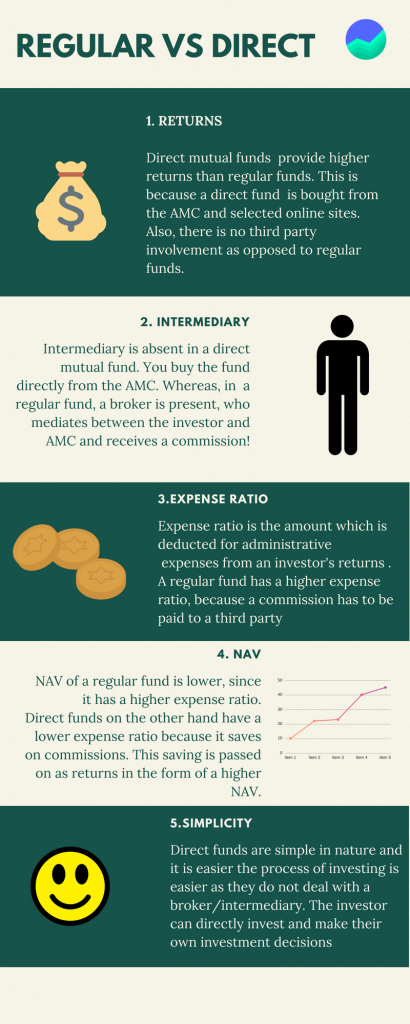Direct vs Regular Mutual Fund: Which is better?

Every mutual fund comes in two versions – direct mutual funds and regular mutual funds.
One of the key distinctions between them is that regular mutual funds (MFs) have a distribution commission, while direct mutual funds do not. This makes the expense ratio higher for regular funds. The expense ratio is the fund’s total expenses to its assets under management (AUM).
This is one of the reasons why direct mutual funds are better than regular ones. But note that there are other reasons for direct MFs beneficial for investors, compared to investment via regular MFs.
Difference Between Direct and Regular Mutual Funds
The expense ratio (fees charged by the mutual fund company) is much lower in direct mutual funds. So, if a scheme charges 0.2% as expense ratio, what it essentially means is that 0.2% of AUM will be used to cover operating and administrative expenses of the funds.
Most people tend to take the help of their preferred mutual fund advisor or their local financial advisory service provider when investing via regular funds.
But, the fee paid to the advisor comes out of your pocket. It is deducted straight from your investment amount and paid to the advisor or agent. This is mostly a part of the expense ratio of the fund. Hence, higher commissions mean a higher expense ratio for mutual funds.
In direct plans of mutual funds, there are no commission fees or distribution charges. Hence, the expense ratio is much lower.
Higher Returns
The returns of any direct mutual fund are always higher than the regular version of the same mutual fund. The main reason behind this is the ‘expense ratio’. The expense ratio is lower for direct plan vs regular plan as mentioned above.
Higher NAV
The Net Asset Value or NAV, of any direct mutual fund, is always higher than the regular version of the same mutual fund.
It represents the value of one unit of mutual fund and is determined by calculating the total assets owned by the fund and dividing it by the number of units outstanding.
The assets owned by the fund generally vary between debt instruments like debentures and bonds and equity instruments like company shares. In some cases, cash might also be a part of the assets owned. The total tally of these instruments is calculated to arrive at the assets owned by the fund.
If the fees paid to the agents can be avoided, then the amounting NAV could be higher.
As a result, direct funds have a higher NAV than regular funds of the same mutual fund.
Fewer Chances of Being Misled
While retail investors might think that having an advisor by their side will be helpful for their investment, they are only partially correct.
A look at the consumer forum will tell you that there is an umpteen number of complaints filed against wealth advisory agents who duped investors and stole millions. While not all agents are fraudulent, the mere fact that their compensation is on a commission basis and depends on your investment amount brings about a conflict of interest.
With direct funds, the chances of such activity are low.
You’re in Control
With direct funds, you’re fully in control of your mutual fund investments. Being in control also means that you need to do your own homework into studying about the funds. A little effort from your end can go a long way.
You would have a complete understanding of how mutual funds work, how AMCs process transactions, updating your KYC and many other procedural tasks that will make you an empowered investor.
While the general populace might be content with commission-based agents shouldering their investments, it might be helpful to take a more active approach to your long-term financial goals.
Learn a bit about the AMC you want to invest in and compare their funds or take up the services offered by wealth management sites like Groww that help you build your own portfolio or invest in a pre-made portfolio based on your needs.
Happy investing!
|
You May Also Be Interested to Know- |
|
|
1. |
|
|
2. |
|
|
3. |
|
|
4. |
|
|
5. |
|
Disclaimer: This blog is solely for educational purposes. The securities/investments quoted here are not recommendatory.
To read the RA disclaimer, please click here
Research Analyst - Aakash Baid
|
Check More Mutual Fund Schemes |
|
